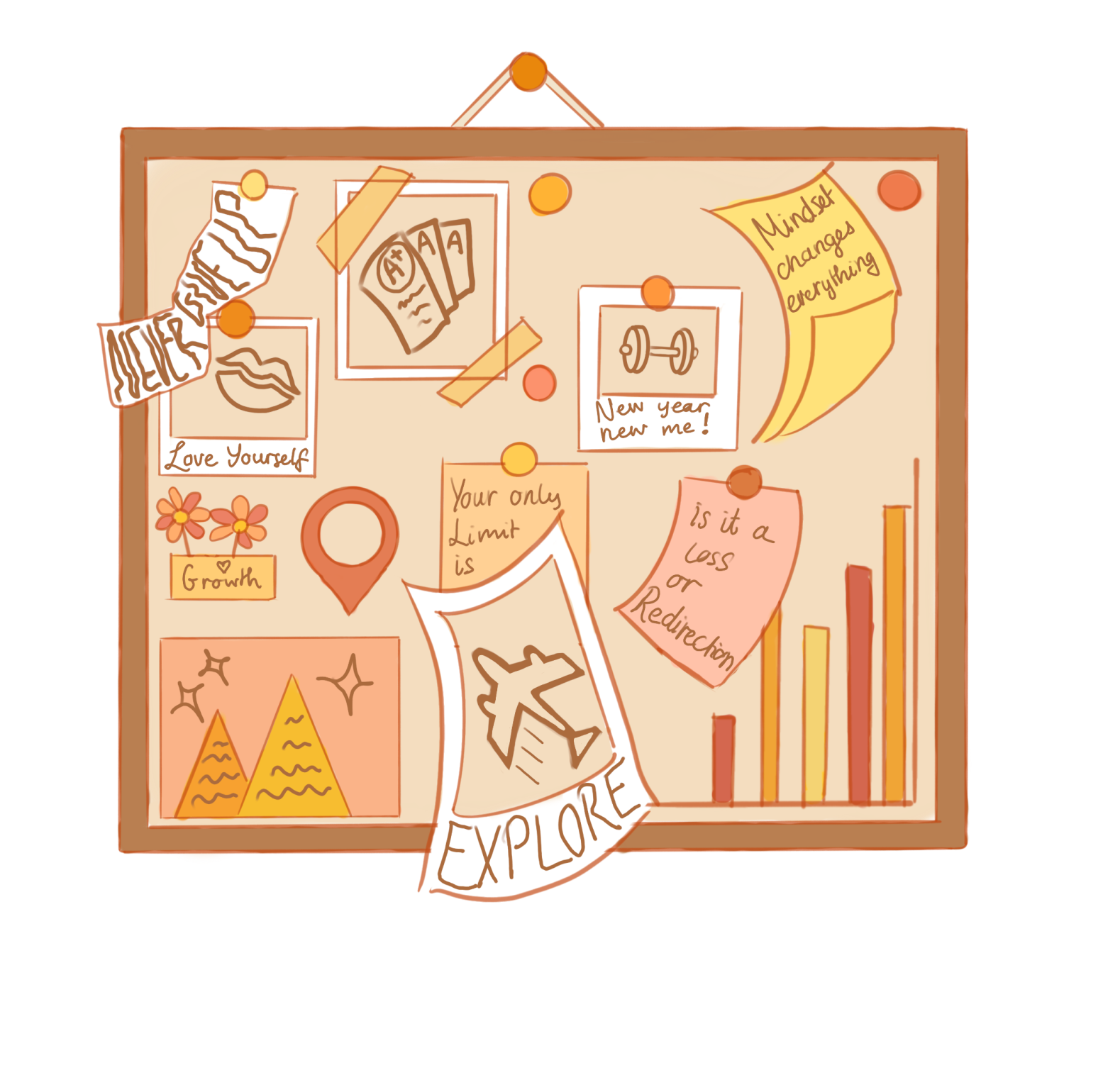On New Year’s Day, junior Talia Boneh settles into her favorite spot at her local coffee shop with her laptop in hand, ready to set the tone for the year ahead. On one tab, Pinterest fills the page with images of study aesthetics and healthy food “inspo”; on another, Canva — the canvas for the digital collage that will shape her 2025.
Boneh said she creates a board at the beginning of each year because of its fun and simplicity.
“It really forces you to think through what you want for yourself and what kind of lifestyle you want to live, so having all that up there as a reminder of the kind of person you want to be is really helpful,” Boneh said. “It can be easy to feel very immersed in everything that’s going on in your life, and you feel like you don’t really know what’s going on, so having that reminder that you’re still a person and you still have goals that you can work towards—it’s grounding in a way.”
Boneh is one of many students who uses vision boards — collages of images, quotes and goals — as a way to stay motivated and set intentions for the new year. While created as a tool for reflection and inspiration, vision boards have gained widespread popularity beyond personal use. A TD Bank survey found that one in five successful entrepreneurs use vision boards when starting their business, with 76% reporting their progress has aligned with their vision.
Freshman Nieve Teetzel agreed and said her vision board incorporates areas of her life she wanted to improve from last year.
“I look at it pretty much every day, maybe not actively, but at least when I wake up I see it on my desk, and I think that’s a really great way to start your day — to just ground yourself,” Teetzel said.
For Boneh, these daily goals in digital format are a constant reminder of her priorities.
“I actually set my vision board as my wallpaper on my iPad, so whenever I open up my iPad to go study, I have this really big layout of ‘be healthy,’ ‘be productive,’ ‘be focused,’” Boneh said. “Over time, I might start paying a little bit less attention to my mood board, but it’s still there as a reminder.”
Vision boards are often tied to the concept of manifestation, the idea that focusing on specific goals can help bring them to reality.
While psychology teacher Chris Farina said there haven’t been many studies on manifestation, he noted for many people it may have similar results to the placebo effect.
“Your beliefs about what outcomes are likely to be do have a psychological impact,” Farina said. “We know from a biomechanical standpoint it’s not actually doing anything. What it really seems to be doing is boosting their confidence, and so when they do that ritual, they actually do perform better.”
Because of how motivation works, Farina said vision boards could have a larger impact than writing down goals in a text format.
“Having the visual component to it has a strong impact because not only have you taken the time to create what that vision looks like, but it helps you more clearly realize the outcome that you’re striving for,” Farina said.
However, Farina said some vision boards lack the procedure and specificity that SMART goals, a type of goal-setting framework emphasizing Specific, Measurable, Achievable, Relevant, and Time-bound objectives, provide.
“The specificity of doing SMART goals helps in a way that maybe like a pure vision board of just the outcome might be a little bit more general,” Farina said. “Oftentimes, if people set a goal, the goal might just be the outcome rather than the process that leads to an outcome. And if you just focus on the outcome, you’re less likely to see results.”
Overall, Farina said he believes vision boards can help people keep their motivation up and keep striving.
“There can be an interpretation of, ‘they project an aura out into the world, then the world will change’ — there’s no scientific evidence for that,” Farina said. “But it does make you more likely to maintain your efforts even when things get tough.”
Boneh agrees and said whether vision boards are effective is largely dependent on the mindset of who made them.
“It just reminds me of what I want myself to be doing,” Boneh said. “It’s honestly really dependent on the person and how disciplined they are with themselves, and how much they really want to come through with their goals. The vision board is something to help push you, but at the end of the day, it is you who’s initiating it.”
For Teetzel, vision boards should be used to embrace and celebrate rather than reinvent.
“There’s a common misconception that creating a vision board is about becoming a better version of yourself, but for me, making the vision board was about inspiring myself to live my best life with the self I already have,” Teetzel said. “It’s been great to have that in my room as a constant reminder of the things I love and the things that I can achieve.”



